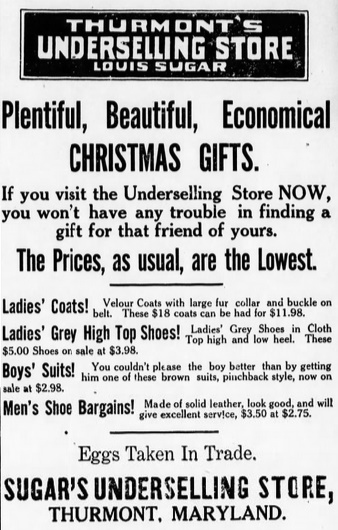
Businesses Past...
sugar’s underselling store
by Richard D. L. Fulton
Sugar’s Underselling Store, also known as Thurmont’s Underselling Store, was—for that particular time—a rather unusual business that operated in Thurmont from 1916 through 1918, one that ultimately accepted eggs in payment for goods purchased.
Sugar’s Underselling Store was essentially a late-Victorian version of today’s Ollie’s or Big Lots, or even Sam’s Club (less the membership fees), premised on buying in bulk and selling cheap.
Apparently, for such a largely successful enterprise, by all period accounts, its precise location in Thurmont still remains a mystery.
What is known is that Sugar’s Underselling Store was founded by Louis Sugar, who opened the store in March 1916.
The Catoctin Clarion reported in its March 23, 1916, issue, “An opening in which everybody will be interested in is that of Mr. Louis Sugar of the Thurmont Underselling Store.” The grand opening took place on Saturday, March 25.
The newspaper further noted that Sugar was busy “arranging his stock of goods” and that on opening day “will have a large variety of goods to show the public.”
An advertisement placed by Sugar in the March 23 issue of The Catoctin Clarion promised free souvenirs to all ladies who visited the store on opening day.
Within the advertisement, Sugar noted that he was dedicating the new store “wholly to the service of all the people in Thurmont and vicinity,” and further claimed the store would “give your cash greater buying power than it ever had.”
Sugar subsequently placed an advertisement in The Catoctin Clarion on March 30, in which he thanked “all you good people in Thurmont and vicinity for making the opening of the Thurmont Underselling Store a grand success.”
In an advertisement placed in the April 6, 1916, issue of The Catoctin Clarion, Sugar explained that the reason he could sell merchandise at such low prices was that he purchased his stock paying in cash (as per buying stock on credit).
As an example of the wares and prices offered at the store, in a May 30, 1916, advertisement, he listed ladies’ crepe kimonas (sic) for 79 cents; children’s dresses for 29 cents; young men’s suits for $4.95; corsets for 95 cents; and men’s odd coats for $1.98.
What about the eggs?
Beginning in late May 1917, without explanation, Sugar decided to accept eggs in lieu of cash payments for items purchased, which was posted in every advertisement that appeared in The Catoctin Clarion, from May 24, 1917, through September 19, 1918.
But one explanation might be “eggflation” experienced during 1917 and 1918, when the retail price for eggs rose to 40 cents up to 90 cents per dozen. This comes to about $7.75 to $14.93 a dozen in todays money, according to greenmachinefarm.com.
However, the more than three-year run from the opening day on March 25, 1916, until September 28, 1918, came to a sudden end, with an advertisement placed in the September 26 issue of The Catoctin Clarion, declaring that Thurmont’s Underselling Store was holding “the greatest closing-out sale ever held.”
The close-out sale was slated for Saturday, September 28. In his close-out advertisement, Sugar had declared, “The bargains I will give you will be the talk of the town for years to come.”
The Catoctin Clarion reported in its September 26 issued that “In this issue, our readers will find the announcement of Mr. Louis Sugar, not for a great Fall and Winter (sale) Opening, but to the contrary that he is going out of business.”
The newspaper further wrote, “The uncertainty of his being called or not called to service in the army has caused him to take this step,” noting that Sugar “had made many friends since he came to Thurmont.”
The whereabouts of Sugar thereafter remains even more obscure than the former location of his store. Apparently, he did move from the area, possibly to Baltimore. In an advertisement placed in The Catoctin Clarion, on October 24, 1918, Sugar stated, “Lots of household furniture for sale. Store room to rent. Apply to Louis Sugar, Thurmont.

Sugar’s Underselling Store advertisement from 1917, stating eggs acceptable in lieu of cash.
